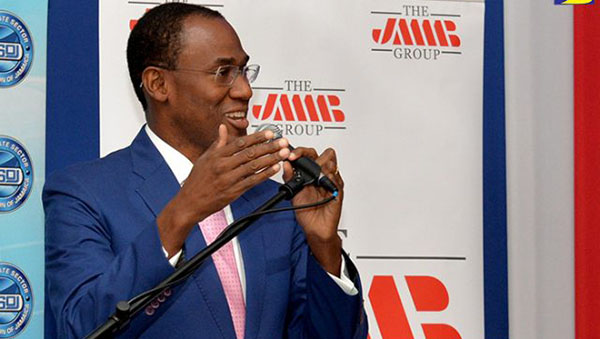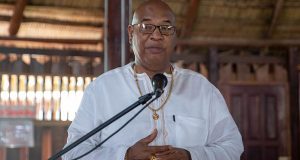WASHINGTON, DC May 30, 2020 (CMC) – The Jamaica government projects, the local economy is expected to contract, by over five percent this fiscal year, as the island implements measures to deal with the impact of the coronavirus (COVID-19) pandemic.
Finance and Public Service Minister, Dr. Nigel Clarke, in an interview with IMF Country Focus, confirmed that the Andrew Holness administration has established a special task force to effectively respond to the economic impact of the crisis.
Earlier this month, the International Monetary Fund (IMF) announced that Jamaica had requested emergency financing, totalling US$520 million, from the Washington-based financial institution.
The Finance Minister said that, as with most economies around the world, the Jamaican economy has been significantly-impacted, by the effects of the COVID-19 pandemic that had resulted in a lockdown of the island, since the month of March.
“The economy is expected to contract, by over five percent this fiscal year. Furthermore, government revenues are expected to decline by double digits, even as emergency health expenditures, as well as social and economic support expenditures, rise.
“Our balance of payments will also be negatively-impacted, by our considerably lower inflows from tourism and remittances, which, prior to the pandemic, represented approximately 20 and 15 percent of GDP, respectively. As such, the COVID-19 pandemic is having a multi-dimensional impact.”
He told the IMF Country Focus that the government has implemented a social and economic support program, called the CARE Program, which provides assistance to vulnerable individuals and small businesses, through innovative and existing delivery channels.
Clarke said that the program also provides for compassionate grants to those, who were unemployed or informally employed, pre-pandemic; temporary unemployment benefits to the previously employed, who have been laid off or terminated, since the pandemic; and grants to the self-employed, whose regular earnings have been disrupted, in addition to grants to small businesses.
He said the CARE Program also incentivizes employers in targeted sectors, to remain connected to their employees.
“Transfers are made to businesses that retain employees (who are below a particular income level) on their payroll. Among other measures, the CARE Program provides support for the sick, the elderly, the disabled, and those, who were economically vulnerable, pre-pandemic, by supplementing existing programs.
“In addition, we have supported new health expenditures. The fiscal year 2020/21 budget is being adjusted to accommodate lower revenues, new expenditures, re-prioritizing of previously-planned expenditures, and utilization of cash resources,” Clarke added.
He told the publication that even during these unprecedented times, the government has taken, and will continue to take, steps to ensure transparency and good governance in spending and procurement, associated with the COVID-19 policy responses.
“For example, we plan to publish key information on procurement contracts and, as we have already done with the CARE Program, will request that the Auditor General’s Department undertake and publish an audit of COVID-19-related spending.”
Clarke said that the reform programs that had been initiated by the government, ahead of the pandemic, has helped to maintain a stronger and more resilient economy.
“The most obvious way is, that we have encountered the pandemic with significantly lower debt than we had when we entered the global financial crisis, ten years ago. This has provided some flexibility.
“In addition, we had accumulated cash resources of over 3 percent of GDP, through public body reform, inclusive of divestment of state enterprises, and fiscal over-performance. We were planning to use these resources to accelerate debt repayment.”
Clarke said that due to the COVID-19 pandemic, “we will instead, need to draw down on these resources, to assist in financing budgetary expenditures, in light of the decline in revenues and the new emergency expenditures that have arisen.
“The reforms that gave rise to these cash resources, have put Jamaica in a much stronger position, with a wider pool of options,” he said, adding “Jamaica’s monetary policy framework was strengthened, over the course of the Stand-By Arrangement, with price stability becoming the central goal of monetary policy, under a flexible exchange rate regime”.
He said this allowed for significant reserve accumulation, with non-borrowed net international reserves increasing, by over one billion dollars.
“Work continues, to further develop foreign exchange and debt markets, which will be critical in sustaining an efficient intermediation of capital, to support increased investment in Jamaica.”
Clarke said that Jamaica intends to use the requested IMF assistance “to strengthen the reserves at the Bank of Jamaica”.
“As of now, we do not need the financing facility for budgetary support. We are using our own cash resources and other programmed budgetary inflows,” he added.
 Pride News Canada's Leader In African Canadian & Caribbean News, Views & Lifestyle
Pride News Canada's Leader In African Canadian & Caribbean News, Views & Lifestyle





